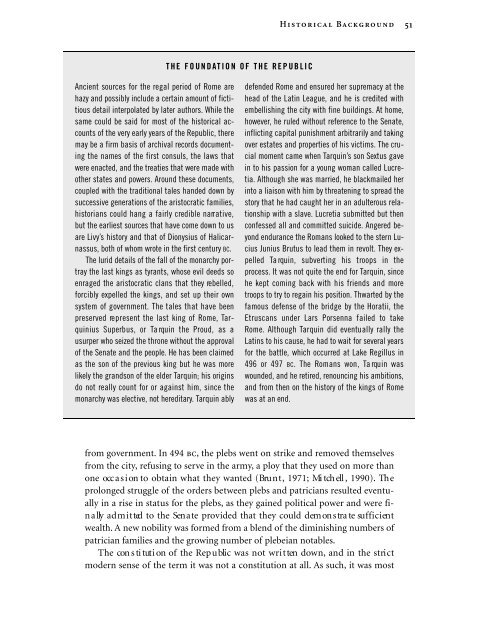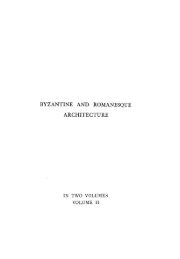The Roman Army: A Social and Institutional History - Karatunov.net
The Roman Army: A Social and Institutional History - Karatunov.net
The Roman Army: A Social and Institutional History - Karatunov.net
You also want an ePaper? Increase the reach of your titles
YUMPU automatically turns print PDFs into web optimized ePapers that Google loves.
Ancient sources for the regal period of Rome are<br />
hazy <strong>and</strong> possibly include a certain amount of fictitious<br />
detail interpolated by later authors. While the<br />
same could be said for most of the historical accounts<br />
of the very early years of the Republic, there<br />
may be a firm basis of archival records documenting<br />
the names of the first consuls, the laws that<br />
were enacted, <strong>and</strong> the treaties that were made with<br />
other states <strong>and</strong> powers. Around these documents,<br />
coupled with the traditional tales h<strong>and</strong>ed down by<br />
successive generations of the aristocratic families,<br />
historians could hang a fairly credible narr a t i v e ,<br />
but the earliest sources that have come down to us<br />
are Livy’s history <strong>and</strong> that of Dionysius of Halicarnassus,<br />
both of whom wrote in the first century BC.<br />
<strong>The</strong> lurid details of the fall of the monarchy portray<br />
the last kings as tyrants, whose evil deeds so<br />
enraged the aristocratic clans that they re b e l l e d ,<br />
f o rcibly expelled the kings, <strong>and</strong> set up their own<br />
system of government. <strong>The</strong> tales that have been<br />
p re s e rved re p resent the last king of Rome, Ta rquinius<br />
Superbus, or Ta rquin the Proud, as a<br />
usurper who seized the throne without the approval<br />
of the Senate <strong>and</strong> the people. He has been claimed<br />
as the son of the previous king but he was more<br />
likely the gr<strong>and</strong>son of the elder Tarquin; his origins<br />
do not really count for or against him, since the<br />
monarchy was elective, not hereditary. Tarquin ably<br />
THE FOUNDATION OF THE REPUBLIC<br />
H i s t o r i c a l Ba c k g r o u n d 51<br />
defended Rome <strong>and</strong> ensured her supremacy at the<br />
head of the Latin League, <strong>and</strong> he is credited with<br />
embellishing the city with fine buildings. At home,<br />
however, he ruled without reference to the Senate,<br />
inflicting capital punishment arbitrarily <strong>and</strong> taking<br />
over estates <strong>and</strong> properties of his victims. <strong>The</strong> crucial<br />
moment came when Tarquin’s son Sextus gave<br />
in to his passion for a young woman called Lucretia.<br />
Although she was married, he blackmailed her<br />
into a liaison with him by threatening to spread the<br />
story that he had caught her in an adulterous relationship<br />
with a slave. Lucretia submitted but then<br />
confessed all <strong>and</strong> committed suicide. Angered beyond<br />
endurance the <strong>Roman</strong>s looked to the stern Lucius<br />
Junius Brutus to lead them in revolt. <strong>The</strong>y expelled<br />
Ta rquin, subverting his troops in the<br />
process. It was not quite the end for Tarquin, since<br />
he kept coming back with his friends <strong>and</strong> more<br />
troops to try to regain his position. Thwarted by the<br />
famous defense of the bridge by the Horatii, the<br />
E t ruscans under Lars Porsenna failed to take<br />
Rome. Although Ta rquin did eventually rally the<br />
Latins to his cause, he had to wait for several years<br />
for the battle, which occurred at Lake Regillus in<br />
496 or 497 B C. <strong>The</strong> <strong>Roman</strong>s won, Ta rquin was<br />
wounded, <strong>and</strong> he retired, renouncing his ambitions,<br />
<strong>and</strong> from then on the history of the kings of Rome<br />
was at an end.<br />
from government. In 494 bc, the plebs went on strike <strong>and</strong> removed themselves<br />
from the city, refusing to serve in the army, a ploy that they used on more than<br />
one occ a s i on to obtain what they wanted (Bru n t , 1 9 7 1 ; Mi tch ell , 1 9 9 0 ) . Th e<br />
prolonged struggle of the orders between plebs <strong>and</strong> patricians resulted eventually<br />
in a rise in status for the plebs, as they gained political power <strong>and</strong> were fin<br />
a lly ad m i t ted to the Sen a te provi ded that they could dem on s tra te su f f i c i en t<br />
wealth. A new nobility was formed from a blend of the diminishing numbers of<br />
patrician families <strong>and</strong> the growing number of plebeian notables.<br />
<strong>The</strong> con s ti tuti on of the Rep u blic was not wri t ten down , <strong>and</strong> in the stri ct<br />
modern sense of the term it was not a constitution at all. As such, it was most










